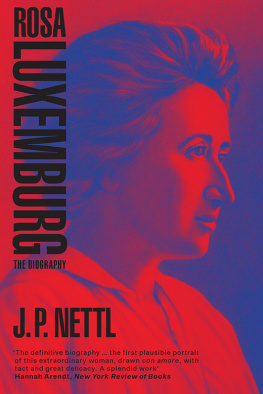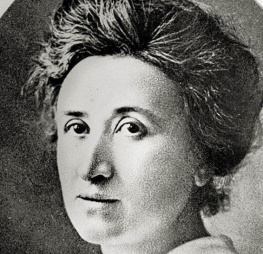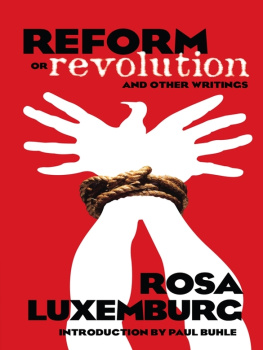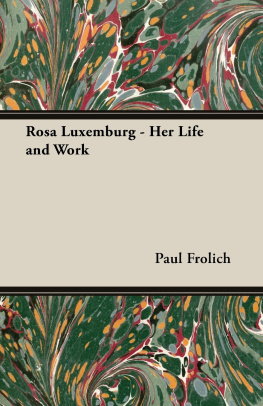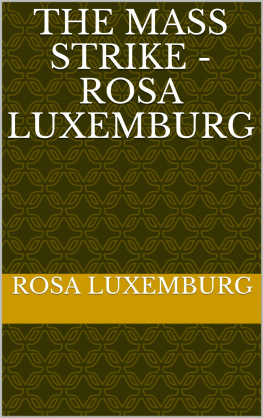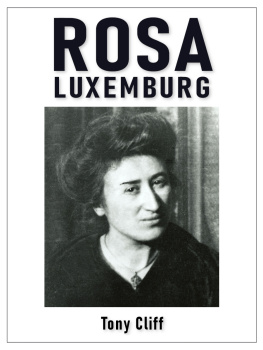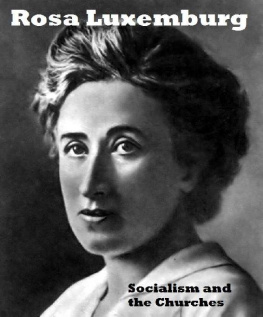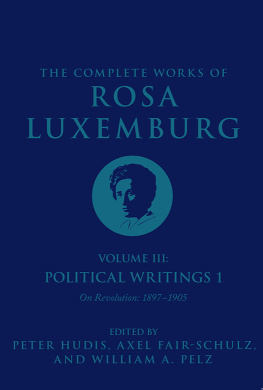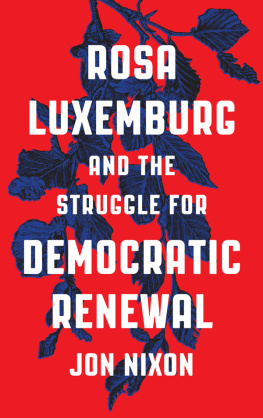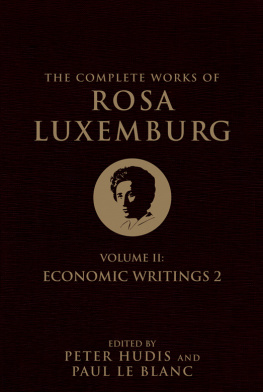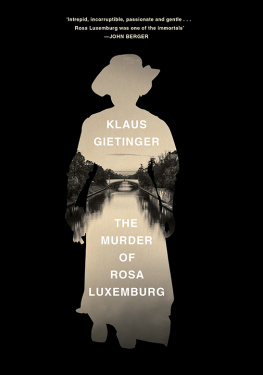Contents

Rosa
Luxemburg
Rosa
Luxemburg
J. P. NETTL
In Two Volumes

First published by Verso 2019
This is an unabridged reprint of the two-volume work
published by Oxford University Press, 1966
2019 the estate of John Peter Nettl
All rights reserved
The moral rights of the author have been asserted
1 3 5 7 9 10 8 6 4 2
Verso
UK: 6 Meard Street, London W1F 0EG
US: 20 Jay Street, Suite 1010, Brooklyn, NY 11201
versobooks.com
Verso is the imprint of New Left Books
ISBN-13: 978-1-78873-167-6
ISBN-13: 978-1-78873-169-0 (US EBK)
ISBN-13: 978-1-78873-168-3 (UK EBK)
British Library Cataloguing in Publication Data
A catalogue record for a previous edition of this book
is available from the British Library
Library of Congress Control Number: 2018959392
Printed in the UK by CPI Mackays
CONTENTS
ILLUSTRATIONS
VOLUME I
VOLUME II
(Note. This photograph appeared in Rote Fahne in the course of its campaign to bring the murderers to justice. The following extract from the court proceedings appeared as a caption: Trooper Krause replies to the question of the presiding judge and confirms that the day following the incident, a photographer took a picture of the company in the Eden Hotel, seated round a table. A waitress was also present, and a bottle of wine stood on the table. Presiding judge: The whole thing appears to make the impression of a feast. Witness Krause: Not at all. Accused Runge laughs. Presiding judge: Accused Runge, you must behave properly. This is no laughing matter.)
Rosa Luxemburgs Corpse, March 1919
Photographs by courtesy of: International Institute of Social History, Amsterdam; Zaklad Historii Partii, KC PZPR, Warsaw; SPD Archives, Bonn.
INTRODUCTION:
LUXEMBURG IN OUR TIME
I.
I t has often been said that one of the worst fates to befall a writer is to be referred to while rarely being read; the same could be said of a revolutionary who is heralded but rarely followed. And so it is when it comes to the legacy of Rosa Luxemburg.
Luxemburg has long been considered one of the most outstanding theoreticians of the radical tradition. Yet the expansiveness of her contributionswhich include political theory, economics, social history, sociology, ethnology, cultural studies and a series of remarkable letters exploring what it means to be human on an individual as well as social levelhas made it easy to emphasize one or another aspect of her thought without considering the whole. This is surely not helped by the lack of availability of much of her work; even today the bulk of her writings have yet to make it into English.
Luxemburg has also long been heralded as one of the most independently minded revolutionaries of the Marxist tradition. In devoting her theoretical, political and personal life to the fight against capitalism, she did not hesitate to sharply criticize her fellow socialistsboth reformists and revolutionariesfor adopting policies that constrain the freedom of the individual. Although her example has inspired many over the years, no large-scale political movement has ever been defined by her theoretical perspective (in contrast to such figures as Lenin, Trotsky or Che Guevara). There is a long history of paying homage to her idealism while expressing diffidence as to its practical import for contemporary politics.
This is changing. Much more of her work has become available in recent years: Two new volumes (of almost 900 pages each) of New collections of her writings as well as books and symposia on them have appeared in Spanish, Portuguese, French, Italian, Polish, Japanese, Korean, Russian and Arabic. It is no exaggeration to say that Luxemburg is being studied more around the world today than at any previous time.
This coincides with growing interest in socialism and Marxist theory since the global economic meltdown of 2008; such interest has only intensified with the upsurge of xenophobic nationalism and racism, sexism and environmental destruction in the United States, Europe and the developing world. The failure of liberalism to impede the destructive logic of capital points to the need for a revolutionary alternativewhile the legacy of unfinished and failed revolutions haunts the global imagination. Luxemburg speaks to this situationnot despite but because of her sharp criticism of the socialists of the Second International and the policies pursued by the Bolsheviks after their seizure of power in 1917. At issue is whether a viable alternative to capitalism can be developed that avoids the drastic mishaps and failures that characterized efforts to create socialist societies in the distant and recent past. The dilemma facing us today involves our inability to solve the human problem short of revolution, on the one hand, and the failure of revolutions that occurred up to this point to solve this same problem, on the other. The work of Rosa Luxemburg is a vital source for working through this antimony.
II.
For these reasons, the reissuance of J.P. Nettls Rosa Luxemburg (first published in 1966), which is the most comprehensive English-language biography of Rosa Luxemburg to date, could hardly come at a better time. Nettls biography remains a crucial source because of his extensive knowledge of Luxemburgs life and work as well as the historical context in which it unfolded.
The latter is especially significant. It is hardly possible to make sense of Luxemburgs political positions and pronouncements without being keenly aware of the forces and figures at play in the German Social Democratic Party (SPD) and the Second International; the political situation in Russian-occupied Poland and how it differed from other areas in which Poles lived under foreign domination; the historical peculiarities that defined social relations in the Russian Empire and how they had an impact on the course of the 19051907 revolution; and much more. Nor is it possible to fully grasp her development without a comprehensive knowing of the twists and turns in the political fortunes of her political colleagues as well as adversaries. Lenin is perhaps the most obvious case in point. Although she sharply criticized him at numerous points in her revolutionary career, that did not stop her from maintaining close personaland at times politicalrelations with him. In fact, he was one of the few male revolutionary figures that she actually admired. Subsequent efforts to claim an absolute opposition between them on all issues, as well as attempts to downplay the political and theoretical gap that separated them on a number of specific matters, do not do justice to who she really was. Luxemburgs contribution cannot be accessed solely through her writings; they need to be explored in relation to the historical contingencies and particularities that they responded to.
Nettls extensive knowledge of the social, political and historical context of the European socialist movements of the time is underscored by his use of primary sources in Polish, German and Russianthe languages in which Luxemburg composed her own That Nettl incorporates one of the most extensive discussions of her work in the Polish movement, which is but one reflection of his thoroughgoing knowledge of the humus from which her ideas arose and developed, remains one of the outstanding achievements of his book.
Hannah Arendt captured the sense of this in her Introduction to the abbreviated edition of Nettls biography in 1969: Unlike other biographies, history is here not treated as the inevitable background of a famous persons life span; it is rather as though the colorless light of historical time were forced through and refracted by the prism of A great biographer shows how the

